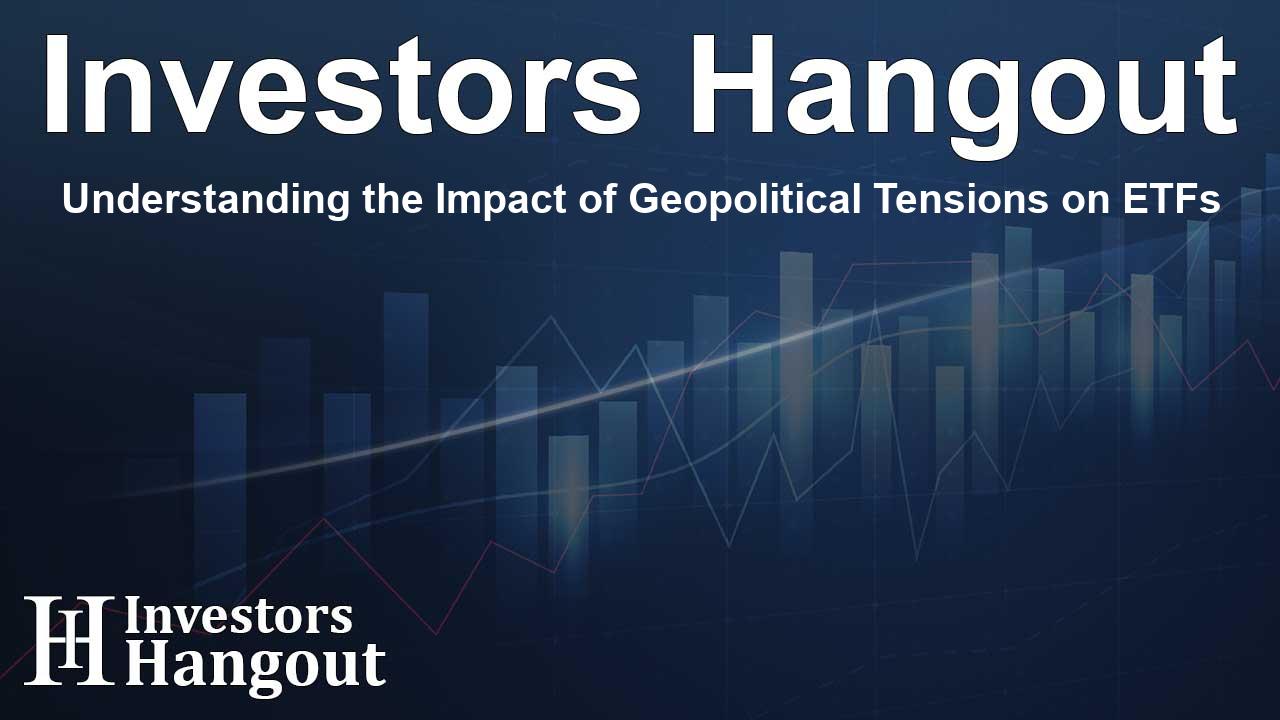Understanding the Impact of Geopolitical Tensions on ETFs

Geopolitical Tensions and Their Impact on Stocks
Lockheed Martin Corp (NYSE: LMT) stands as a leader in the aerospace and defense sectors, representing a unique situation in today's equities market. Typically, geopolitical tensions create a challenging environment for capital growth. Investors often seek higher risk premiums compared to stable assets like U.S. Treasuries, which can lead to decreasing company valuations. Additionally, increased uncertainty prompts a flight to safety, resulting in a rise in the prices of commodities such as gold.
The Complex Nature of Capital Flight
Despite the overall trends during heightened geopolitical issues, defense contractors like Lockheed Martin often find themselves in a more favorable position. The escalation of global conflicts drives up the demand for military assets, including weapons and various support systems, which can sometimes mitigate broader market declines. For instance, shortly after Israel intensified its military actions against Iran, the share price of Lockheed Martin surged noticeably.
Understanding Lockheed Martin's Financial Standing
Nevertheless, Lockheed Martin is also subject to the pressures faced by everyday investors. In its recent earnings announcement, which exceeded Wall Street’s expectations, the company reported earnings per share of $7.29, topping the analyst consensus of $6.63. This result marked an uptick from the previous year's figure of $7.11. However, the reported revenue of $18.16 billion fell short of the anticipated $18.63 billion, although it represented a slight uptick from last year's $18.12 billion.
Current Market Performance and Trends
Following this earnings report, LMT's stock price took a tumble. Since the start of the current year, the stock has dropped over 8%, a stark contrast to the S&P 500 index's gain of approximately 10% in the same timeframe. Nonetheless, market optimism remains justified due to the ongoing geopolitical tensions around the globe. The conflict in Ukraine serves as a significant flashpoint, remaining in a stagnant state with no immediate resolution in sight.
Investing in Direxion ETFs
In response to the fluctuating market dynamics surrounding entities like Lockheed Martin, Direxion has introduced two innovative investment vehicles. For those with bullish outlooks, the Direxion Daily LMT Bull 2X ETF (LMTL) aims to provide 200% of the performance of LMT's stock. Conversely, those holding a bearish outlook may look into the Direxion Daily LMT Bear 1X ETF (LMTS), designed to mirror the inverse performance of LMT.
Benefits of Direxion ETFs
Direxion ETFs have gained traction among retail investors primarily due to their flexibility. These funds provide a simpler alternative to complex financial derivatives commonly required for leveraged or short positions, which can often pose challenges for individual investors. Being able to buy and sell them like any standard publicly traded security lowers the barrier to entry for many traders.
Risks Inherent in Leveraged ETFs
However, those interested in Direxion ETFs should be mindful of their unique risks. Leveraged and inverse ETFs typically exhibit greater volatility compared to traditional funds closely tracking benchmarks like the S&P 500. Moreover, these ETFs are engineered for short-term exposure, with daily compounding effects that can lead to value erosion if held for extended periods.
Analyzing the LMTL ETF
Launched recently, the LMTL ETF offers limited data for analysis yet shows promise. Technical analysts may gauge interest levels in LMTL by analyzing trends in the underlying LMT stock. Currently, significant bullish indicators stem from the influence of the ongoing Ukraine conflict on LMT's recent stock rally.
Considering the LMTS ETF
Similarly, the LMTS ETF, which correlates inversely with LMT, also presents a limited historical context for evaluation. Even though LMT stock has seen recent fluctuations upward, it is trailing well behind its high for the year. One significant point of interest for traders includes whether LMT can overcome resistance from its 50-day moving average; a failure here could highlight the LMTS ETF as a viable investment option.
Frequently Asked Questions
What are the main influences on Lockheed Martin's stock price?
Lockheed Martin's stock price is significantly influenced by geopolitical events and market demand for defense contracts and military hardware.
How do Direxion ETFs like LMTL and LMTS function?
Direxion ETFs offer leveraged exposure to Lockheed Martin, with LMTL seeking to amplify gains, while LMTS aims to inverse LMT’s performance.
What risks are associated with investing in leveraged ETFs?
Investors should be aware that leveraged ETFs like those from Direxion can introduce higher volatility and potential value loss if held beyond a single day due to compounding effects.
Are Direxion ETFs suitable for all investors?
While Direxion ETFs provide a flexible trading approach, they carry unique risks and complexities that may not be appropriate for all investor profiles.
What trends are currently affecting the defense sector?
The rising geopolitical tensions globally are prompting increased defense spending, which in turn can have positive implications for major defense contractors like Lockheed Martin.
About The Author
Contact Olivia Taylor privately here. Or send an email with ATTN: Olivia Taylor as the subject to contact@investorshangout.com.
About Investors Hangout
Investors Hangout is a leading online stock forum for financial discussion and learning, offering a wide range of free tools and resources. It draws in traders of all levels, who exchange market knowledge, investigate trading tactics, and keep an eye on industry developments in real time. Featuring financial articles, stock message boards, quotes, charts, company profiles, and live news updates. Through cooperative learning and a wealth of informational resources, it helps users from novices creating their first portfolios to experts honing their techniques. Join Investors Hangout today: https://investorshangout.com/
The content of this article is based on factual, publicly available information and does not represent legal, financial, or investment advice. Investors Hangout does not offer financial advice, and the author is not a licensed financial advisor. Consult a qualified advisor before making any financial or investment decisions based on this article. This article should not be considered advice to purchase, sell, or hold any securities or other investments. If any of the material provided here is inaccurate, please contact us for corrections.
